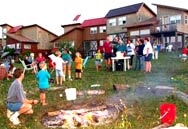
Buy a house, get a community
Abundance Ecovillage is a small, friendly community in Iowa, with 14 houses either built or under construction. It relies on a wind turbine and solar panels for electricity and is self-sufficient for water. Its part of a burgeoning trend all over America.
The infrastructure was already in place when Stacey Hurlin and her husband bought their house and moved in. There was just one catch: a $35,000 one-time fee that covered utility maintenance for her 950-square-foot, $115,000 home and various community projects.
Hurlin doesn’t regret the decision. “It’s remarkable how little we’ve had to compromise our lifestyle to live here,” said Hurlin. “I can’t say I’m living a sparse life. … It’s a lovely home.”
Developer Lonnie Gamble said filtered rainwater and a pond provide water for the community, while a constructed wetland uses plants to break down and clean the sewage.
He said most residents also have installed energy-efficient appliances that have helped reduce their energy consumption by 90 percent. “And their showers are just as hot and their beer is just as cold,” Gamble said.
Despite a national downturn in the real estate market, Gamble said interest in the community is growing. He said the first house was built in 2001 and the subdivision eventually will include about 30 homes. The homes normally cost about $120 per square foot, but the price depends on the developer, Gamble said.
Gamble acknowledged that some people are hesitant about paying the community’s $35,000 fee. He said he tries to explain the long-term benefits of the investment. Some buy in, others walk away.
“We do a lot better with the people who have educated themselves” about the village’s benefits, he said.
Living off the grid remains rare in the United States, with about 350,000 homes in the movement.
Among America’s largest, recent off-grid developments is Three Rivers, a 250-home gated community in central Oregon that gets most of its power from solar panels, said Lynnae Hentzen of the Center on Sustainable Communities, an organization that promotes residential green building.
Housing experts speculate that more Americans would pay more to live green if the opportunities existed.
“People want to be green and sustainable,” said Chris Scotthanson, owner of EcoDevelopments, a Langley, Wash.-based real estate development firm specializing in environmental projects.
Scotthanson said change comes slowly to the housing industry but that the government could speed up the process by providing more incentives for banks to finance such projects.
“The market exists, and we’re not tapping into it,” said Scotthanson, whose firm is working on a proposed green community near Boston. “A lot of developers are looking into it, wish they could make it happen, but they have to find a way to finance it.”